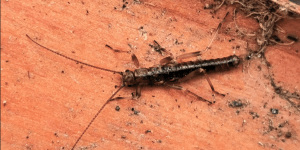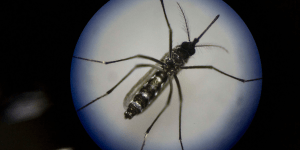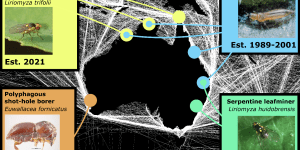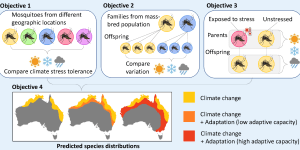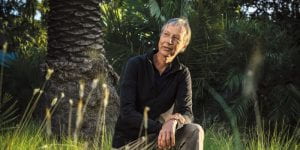Category: News
-
Evolutionary Adaptation to Climate Change | EcolClips Ary Hoffmann interview
-
Victoria’s new habitat law fails to protect a tiny endangered species
By Eddie Tsyrlin and Ary Hoffmann This article was first published on Pursuit. Read the original article. Australia’s unique and diverse wildlife is a source of national pride and global fascination. But this reputation is marred by our country’s alarming rate of species extinction. Australia has already earned the dubious title of the world leader […] -
Scientists and government agencies are targeting mosquitoes with bacteria
by Nancy Endersby-Harshman and Ary Hoffmann This article was first published on Pursuit. Read the original article Dengue fever is one of the most common tropical diseases in the world, affecting several million people every year. It is transmitted by mosquitoes, particularly a species known as Aedes aegypti, the yellow fever mosquito. Dengue is a […] -
The breeding trap targeting Melbourne’s growing mozzie problem
Véronique Paris, Liam Ferguson, Nicholas Bell and Ary Hoffmann Banner: Marianne Coquilleau Mosquito-borne diseases like dengue and Japanese encephalitis may feel like far-distant nightmares for many Victorians. Here, the warmer summer months coinciding with the mosquito season are more synonymous with backyard BBQs and backyard cricket than the smell of tropical strength repellents and mosquito […]blogs.unimelb.edu.au/pearg/2024/02/01/the-breeding-trap-targeting-melbournes-growing-mozzie-problem
-
Novel solutions for pest management
Curious about the progress in managing insect pests in Australian grain crops? Don’t miss the GRDC’s latest podcast episode to catch up on the headway made by the Australian Grains Pest Innovation Program, as Associate Professor Paul Umina provides an update on the ground breaking research currently underway. Tune in here. It’s estimated the Australian grains […]blogs.unimelb.edu.au/pearg/2023/04/20/novel-solutions-for-pest-management
-
Q&A: Victoria’s monster mosquito explosion
By Véronique Paris, Nick Bell and Professor Ary Hoffmann This article was first published on Pursuit. Read the original article. It’s evening and you’re just starting to relax after a hectic day. Just as you do, you hear the unmistakable high whine of a circling mosquito. It’s something most of us are used to in […]blogs.unimelb.edu.au/pearg/2022/11/24/qa-victorias-monster-mosquito-explosion
-
Eddie Tsyrlin interviewed on ABC radio
With all the wet weather in the South and East of Australia there is a surge in interest in the various insects enjoying the conditions. Here Eddie is interviewed on ABC Riverland, you can skip to 2:16:10 to hear the discussion.blogs.unimelb.edu.au/pearg/2022/11/24/eddie-tsyrlin-interviewed-on-abc-radio
-
New DECRA projects coming soon! 2/2
Molecular biosecurity: Genomic databanks for managing invasive pests – Tom Schmidt Insect pests frequently establish invasions in Australia or are detected as incursions at borders, but little is often known about where they’ve come from or how best to manage them now they are here. One way to investigate these questions is to sequence and […]blogs.unimelb.edu.au/pearg/2022/09/27/new-decra-projects-coming-soon-2-2
-
New DECRA projects coming soon! 1/2
Predicting the future threat of mosquitoes under climate change – Perran Stott-Ross Mosquitoes are major global pests, transmitting harmful pathogens to humans and livestock and causing significant nuisance biting. Climate change will lead to unprecedented temperature increases in Australia, shifting the habitats that are suitable for mosquitoes. Insects are capable of rapid evolution, but we […]blogs.unimelb.edu.au/pearg/2022/09/27/new-decra-projects-coming-soon-1-2
-
A brief word from Ary Hoffmann on genetic rescue in Eastern Barred Bandicoots
Further details herehere
Number of posts found: 66
